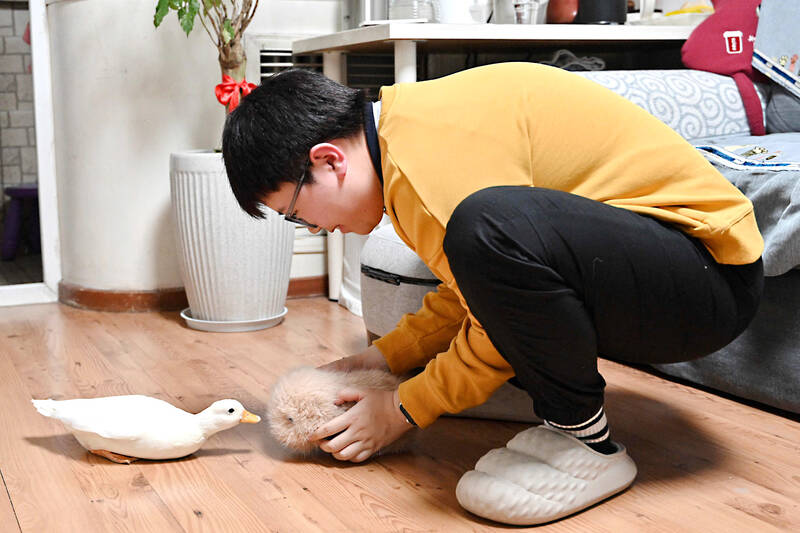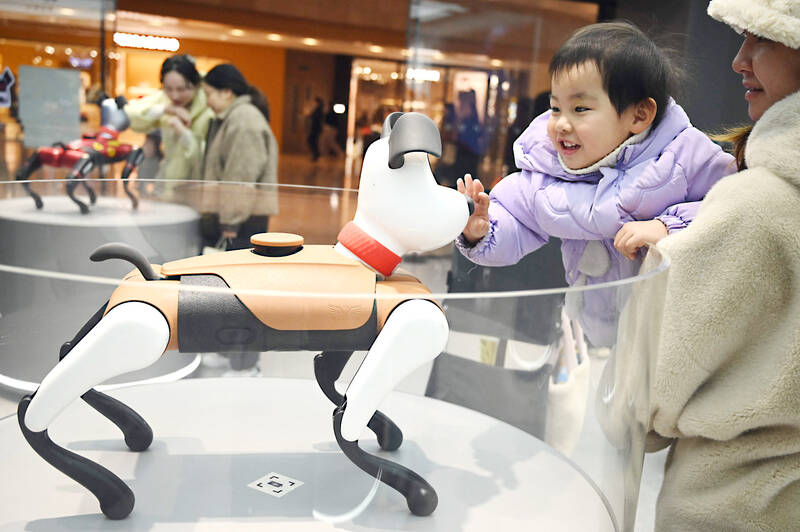At a shopping mall in Beijing, Zhang Yachun murmurs quietly to her closest confidant, a fluffy AI-powered robot whose soothing chirps remind her that she is not alone.
Zhang, 19, has long battled anxiety over school and work, and has struggled to form deep friendships with other people.
But since buying a BooBoo, a “smart pet” that uses artificial intelligence to interact with humans, she says life has become easier.

Photo: AFP
“I feel like I now have someone to share the happy times with,” Zhang said in the apartment she shares with her parents and a real pet duck.
Across China, a growing number of people are turning to AI to combat social isolation as the technology becomes more mature and widely accepted.
Wriggly, furry and resembling a guinea pig, BooBoo is produced by Hangzhou Genmoor Technology and retails for up to 1,400 yuan (US$190).

Photo: AFP
Developed with children’s social needs in mind, it has sold about 1,000 units since May, according to the company’s product manager Adam Duan.
On an outing this month, Zhang ferried her companion, which she named “Aluo” in a cross-body carrier, whispering to the football-sized creature as it nodded and squeaked.
At a pet shop, she pressed the beige bundle up against the window to admire a ginger cat before buying Aluo a tiny winter coat designed for a dog.
She said the robot plays the same role as human friends, adding: “[It] makes you feel you are someone who is needed.”
ROBOT BOOM
The global market for “social robots” like BooBoo is expected to grow by a factor of seven to US$42.5 billion by 2033, according to consulting firm IMARC Group, with Asia already dominating the sector.
For Guo Zichen, 33, a smart pet could help when he is unable to play with his child.
“Right now, family members are spending less time with the children,” Guo said as he examined a robotic dog on sale at the flagship store of tech company Weilan in the eastern city of Nanjing.
“Buying one for my kid can help them with studying and other things,” he mused.
Weilan’s AI dog, called “BabyAlpha”, sells for between 8,000 (US$1,090) and 26,000 yuan (US$3,500), and the company says 70 percent of buyers are families with young children.
But Guo said he was skeptical the electronic pup could bring as much joy as an actual canine.
“The biggest difference is that dogs have souls, while [BabyAlpha] looks different in an indescribable way,” he said.
“On the whole, you feel like it’s not the same as the real thing.”
SHIFTING SOCIETY
While the 1990s introduced electronic pets to the world like Japan’s digital Tamagotchis and American-made Furbies that could mimic speech, computerized companions are becoming more functional with AI.
A growing number of AI products in China cater to people’s emotional needs, from conversational chatbots to lifelike avatars of the deceased.
Social shifts like the impact of the government’s decades-long one-child policy are helping drive market growth, according to experts.
People born in the policy’s early years are now in their 40s and facing an economy burdened with soaring home prices, higher living costs and increased work stress, stretching their ability to focus on their own children.
That, in turn, “leaves little room for personal interactions, prompting people to seek alternative ways to meet their emotional needs,” said Wu Haiyan, a professor specializing in AI and psychology at the University of Macau.
AI companions provide cognitive stimulation, “enhancing the well-being of ... individuals who may otherwise feel isolated,” Wu said.
In some cases, she added, people show more trust in AI than humans.
SAME ON THE INSIDE
Zhang’s father Peng said he understood his daughter’s bond with Aluo.
“When we were young, we didn’t lack friends. We had loads as soon as we stepped out of the door,” the 51-year-old said.
“Now, children in cities seem to be under a lot more pressure, so they may lack friends.”
Zhang, an only child, said she has become more willing to share her worries with her parents since she bought Aluo.
Opening up about her troubles at school has meant that “there aren’t as many things piled up in my heart,” she said.
People of her generation often struggle to communicate face to face, Zhang said, adding that “they might be afraid” to express who they are.
“But what they feel inside has not changed,” she added, cradling Aluo in her lap.

Most heroes are remembered for the battles they fought. Taiwan’s Black Bat Squadron is remembered for flying into Chinese airspace 838 times between 1953 and 1967, and for the 148 men whose sacrifice bought the intelligence that kept Taiwan secure. Two-thirds of the squadron died carrying out missions most people wouldn’t learn about for another 40 years. The squadron lost 15 aircraft and 148 crew members over those 14 years, making it the deadliest unit in Taiwan’s military history by casualty rate. They flew at night, often at low altitudes, straight into some of the most heavily defended airspace in Asia.

Many people in Taiwan first learned about universal basic income (UBI) — the idea that the government should provide regular, no-strings-attached payments to each citizen — in 2019. While seeking the Democratic nomination for the 2020 US presidential election, Andrew Yang, a politician of Taiwanese descent, said that, if elected, he’d institute a UBI of US$1,000 per month to “get the economic boot off of people’s throats, allowing them to lift their heads up, breathe, and get excited for the future.” His campaign petered out, but the concept of UBI hasn’t gone away. Throughout the industrialized world, there are fears that

Like much in the world today, theater has experienced major disruptions over the six years since COVID-19. The pandemic, the war in Ukraine and social media have created a new normal of geopolitical and information uncertainty, and the performing arts are not immune to these effects. “Ten years ago people wanted to come to the theater to engage with important issues, but now the Internet allows them to engage with those issues powerfully and immediately,” said Faith Tan, programming director of the Esplanade in Singapore, speaking last week in Japan. “One reaction to unpredictability has been a renewed emphasis on

Taiwan’s democracy is at risk. Be very alarmed. This is not a drill. The current constitutional crisis progressed slowly, then suddenly. Political tensions, partisan hostility and emotions are all running high right when cool heads and calm negotiation are most needed. Oxford defines brinkmanship as: “The art or practice of pursuing a dangerous policy to the limits of safety before stopping, especially in politics.” It says the term comes from a quote from a 1956 Cold War interview with then-American Secretary of State John Foster Dulles, when he said: ‘The ability to get to the verge without getting into the war is